|
|
|
Sort Order |
|
|
|
Items / Page
|
|
|
|
|
|
|
| Srl | Item |
| 1 |
ID:
182896


|
|
|
|
|
| Summary/Abstract |
This article explores how Mizrahi students from Israel’s periphery, first-generation students of higher education, describe the meaning of the categories of ethnicity and periphery on their path to academe. The data were drawn from in-depth interviews with 25 students, born to two Mizrahi parents, who grew up in the country’s periphery. The findings indicate clearly that the ethnic-Mizrahi discourse has been replaced by a class-periphery discourse. They also show that the main agent of the students’ acquisition of quality pre-academic education and higher education was not school but rather the parents.
|
|
|
|
|
|
|
|
|
|
|
|
|
|
|
|
| 2 |
ID:
144266
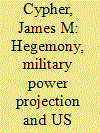

|
|
|
|
|
| Summary/Abstract |
Positing the dawning of a ‘post-American World’, ‘declinists’ have taken little account of the USA’s surging interventionist tendencies and the new political economy of military power arising from the relentless pursuit of global militarism. The USA has long exercised its competitive advantage in military power to enhance its diplomatic clout, as well as to advantageously reposition its national industrial and financial base. The pace of such martial efforts has accelerated as US policy makers, employing a ‘deep engagement’ grand strategy, strive for paradigm maintenance and geopolitical expansion within the periphery. Interventions have been facilitated through new processes and procedures, carefully constructed to create a sufficient degree of autonomy to permit the US state to ‘project power’ without broad societal resistance. US policy is path-dependent, locked into a reflexive pattern, unable and unwilling to learn from its long string of blunders and delusionary adventures. But US policy makers do not suffer a loss of will-to-power, as neo-conservatives allege.
|
|
|
|
|
|
|
|
|
|
|
|
|
|
|
|
| 3 |
ID:
145123
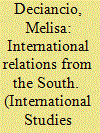

|
|
|
|
|
| Summary/Abstract |
Mainstream international relations (IR) has been built as an extension of imperial concerns. Thus, a restricted focus, even a self-styled demarcation was born: ĺetat ćest moi. This organizational boundary-setting left behind a good deal of the way the discipline evolved in other areas of the world. In this sense, Latin America has been caught between North–South and Western–non-Western traditions, emerging with questions, problems, and challenges different from those of European and North American scholars. Throughout history, Latin-American IR studies have been marginalized from Western mainstream IR approaches, being a theory adopter but not a theory exporter. However, Latin-American IR is not new. We can trace its roots to the nineteenth century when the processes of nation-building arose as a result of the end of the European occupations. Since then, an idea of region started to develop and, with it, several shared approaches to IR emerged. This article aims to bring the Latin-American IR agenda on regionalism into light both in terms of issues and traditions, challenging the conventional wisdom about the sources of IR theory and proving evidence that Latin-American scholars and policymakers made notable contributions that flourished on the edges of the mainstream.
|
|
|
|
|
|
|
|
|
|
|
|
|
|
|
|
| 4 |
ID:
148494


|
|
|
|
|
| Summary/Abstract |
India’s neighbourhood policy seems to be devoid of any strategy to integrate national interests with the concerns of border regions like Northeast India. India’s security-centric approach prevented a cooperative relationship from emerging with its neighbours, while a deeper and intense engagement with them would have benefitted India and helped solve many of the problems that Northeast India is facing today. However, the recent move by India under the Act East Policy to cultivate a much closer relationship with its eastern neighbours is full of possibilities to make India’s neighbourhood policy more accommodative and sensitive towards the needs of Northeast India. In the light of this, the proposed article intends to examine the nature of India’s neighbourhood policy, to assess its implications for the Northeast and finally, to examine whether the recent transnational engagements can initiate development of the Northeast by relieving it from its peripheral and landlocked status.
|
|
|
|
|
|
|
|
|
|
|
|
|
|
|
|
| 5 |
ID:
109592
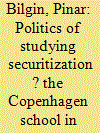

|
|
|
|
|
| Publication |
2011.
|
| Summary/Abstract |
Copenhagen School securitization theory has made significant inroads into the study of security in Western Europe. In recent years, it has also begun to gain a presence elsewhere. This is somewhat unanticipated. Given the worldwide prevalence of mainstream approaches to security, the nature of peripheral international relations, and the Western European origins and focus of the theory, there is no obvious reason to expect securitization theory to have a significant presence outside Western Europe. Adopting a reflexive notion of theory allows, the article argues, inquiry into the politics of studying security, which in turn reveals how the Western European origins and focus of securitization theory may be a factor enhancing its potential for adoption by others depending on the historico-political context. Focusing on the case of Turkey, the article locates the security literature of that country in the context of debates on accession to the European Union and highlights how securitization theory is utilized by Turkey's authors as a 'Western European approach' to security.
|
|
|
|
|
|
|
|
|
|
|
|
|
|
|
|
| 6 |
ID:
149184
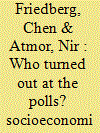

|
|
|
|
|
| Summary/Abstract |
2015 was an important year in the history of Israeli general elections: voter turnout rose by 4.5% compared to the 2013 elections, exceeding the 70% threshold after 16 years of low rates. Interesting as this may be, a more interesting question is: who were the voters turning out at the polls in the 2015 elections (and where)? When looking at the election results from the municipal perspective, we can see a variance between localities: turnouts were high in some places while in others they were low. In order to explain the differences in voting patterns among localities we conducted an ecological analysis of the aggregated data regarding participation rates in 196 municipalities in Israel, as well as their social and economic characteristics. The most salient finding is that political participation in peripheral and low socioeconomic localities was lower than in the country’s geographical and generally more economically robust centre.
|
|
|
|
|
|
|
|
|
|
|
|
|
|
|
|
| 7 |
ID:
147969
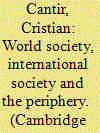

|
|
|
|
|
| Summary/Abstract |
Many studies of world society in the English School claim that non-state actors gain importance in international relations when they try to influence the most important members of the society of states. This article argues that such an approach overlooks the diversity of world society activities. First, it obscures the activities of world society actors beyond the core and therefore offers an incomplete account of the agency such actors exercise in global affairs. Second, it overlooks the fact that non-state actors from the core can disseminate some of the core’s values beyond its borders. The example of British abolitionist contact with the post-slave state of Haiti in the first two decades of the nineteenth century serves as an empirical illustration of these two points. The case study is particularly useful because conventional narratives of abolitionist activism tend to concentrate on contact with the core members of the society of states and overlook equally significant efforts to “teach” former slaves how to become respectable members of the society of states.
|
|
|
|
|
|
|
|
|
|
|
|
|
|
|
|
|
|
|
|
|